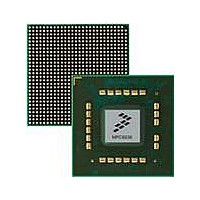MPC8536DS Freescale Semiconductor, MPC8536DS Datasheet - Page 1403

MPC8536DS
Manufacturer Part Number
MPC8536DS
Description
BOARD DEV SYSTEM MPC8536E
Manufacturer
Freescale Semiconductor
Series
PowerQUICC III™r
Type
MPUr
Datasheets
1.MPC8536EBVTAVLA.pdf
(127 pages)
2.MPC8536EBVTAVLA.pdf
(1706 pages)
3.MPC8536DS.pdf
(2 pages)
4.MPC8536DS.pdf
(126 pages)
Specifications of MPC8536DS
Contents
Board, Software and Documentation
Processor Series
MPC85xx
Core
e500
Data Bus Width
32 bit
Maximum Clock Frequency
667 MHz
Operating Supply Voltage
- 0.3 V to + 1.21 V
Maximum Operating Temperature
+ 105 C
Data Ram Size
32 KB
Interface Type
SPI, USB
Program Memory Type
DDR2, DDR3, SDRAM
Core Size
32 Bit
Program Memory Size
544KB
Cpu Speed
1.5GHz
Digital Ic Case Style
BGA
No. Of Pins
783
Supply Voltage Range
0.95V To 1.05V
Rohs Compliant
Yes
For Use With/related Products
MPC8536
Lead Free Status / RoHS Status
Lead free / RoHS Compliant
- MPC8536EBVTAVLA PDF datasheet
- MPC8536EBVTAVLA PDF datasheet #2
- MPC8536DS PDF datasheet #3
- MPC8536DS PDF datasheet #4
- Current page: 1403 of 1706
- Download datasheet (15Mb)
accomplished by incrementing FRINDEX[13–3] based on carry-out on the 7 to 0 increment of
FRINDEX[2–0] and incrementing SOFV based on the transition of 0 to 1 of FRINDEX[2–0].
Software is allowed to write to FRINDEX.
provides the requirements that software should adhere when writing a new value in FRINDEX.
21.6.7
The periodic schedule traversal is enabled or disabled through USBCMD[PSE] (periodic schedule enable).
If USBCMD[PSE] is cleared, then the host controller simply does not try to access the periodic frame list
via the PERIODICLISTBASE register. Likewise, when USBCMD[PSE] is a one, then the host controller
does use the PERIODICLISTBASE register to traverse the periodic schedule. The host controller will not
react to modifications to USBCMD[PSE] immediately. In order to eliminate conflicts with split
transactions, the host controller evaluates USBCMD[PSE] only when FRINDEX[2–0] is zero. System
software must not disable the periodic schedule if the schedule contains an active split transaction work
item that spans the 0b000 micro-frame. These work items must be removed from the schedule before
USBCMD[PSE] is cleared. USBSTS[PS] (periodic schedule status) indicates status of the periodic
schedule. System software enables (or disables) the periodic schedule by setting (or clearing)
USBCMD[PSE]. Software then can poll USBSTS[PS] to determine when the periodic schedule has made
the desired transition. Software must not modify USBCMD[PSE] unless the value of USBCMD[PSE]
equals that of USBSTS[PS].
The periodic schedule is used to manage all isochronous and interrupt transfer streams. The base of the
periodic schedule is the periodic frame list. Software links schedule data structures to the periodic frame
list to produce a graph of scheduled data structures. The graph represents an appropriate sequence of
transactions on the USB.
period of one are linked directly to the periodic frame list. Interrupt transfers (are managed with queue
heads) and isochronous streams with periods other than one are linked following the period-one
iTD/siTDs. Interrupt queue heads are linked into the frame list ordered by poll rate. Longer poll rates are
linked first (for example, closest to the periodic frame list), followed by shorter poll rates, with queue
heads with a poll rate of one, on the very end.
Freescale Semiconductor
FRINDEX[13–3]
Periodic Schedule
N+1
N+1
N+1
N+1
N+1
N+1
N+1
N
Table 21-64. Operation of FRINDEX and SOFV (SOF Value Register)
MPC8536E PowerQUICC III Integrated Processor Reference Manual, Rev. 1
Figure 21-46
Current
SOFV
N+1
N+1
N+1
N+1
N+1
N+1
N
N
FRINDEX[2–0]
illustrates isochronous transfers (using iTDs and siTDs) with a
111
000
001
010
011
100
101
110
Section 21.3.2.4, “Frame Index Register (FRINDEX),”
FRINDEX[13–3]
N+1
N+1
N+1
N+1
N+1
N+1
N+1
N+1
SOFV
Next
N+1
N+1
N+1
N+1
N+1
N+1
N+1
N
Universal Serial Bus Interfaces
FRINDEX[2–0]
000
001
010
011
100
101
110
111
21-69
Related parts for MPC8536DS
Image
Part Number
Description
Manufacturer
Datasheet
Request
R
Part Number:
Description:
Manufacturer:
Freescale Semiconductor, Inc
Datasheet:
Part Number:
Description:
Manufacturer:
Freescale Semiconductor, Inc
Datasheet:
Part Number:
Description:
Manufacturer:
Freescale Semiconductor, Inc
Datasheet:
Part Number:
Description:
Manufacturer:
Freescale Semiconductor, Inc
Datasheet:
Part Number:
Description:
Manufacturer:
Freescale Semiconductor, Inc
Datasheet:
Part Number:
Description:
Manufacturer:
Freescale Semiconductor, Inc
Datasheet:
Part Number:
Description:
Manufacturer:
Freescale Semiconductor, Inc
Datasheet:
Part Number:
Description:
Manufacturer:
Freescale Semiconductor, Inc
Datasheet:
Part Number:
Description:
Manufacturer:
Freescale Semiconductor, Inc
Datasheet:
Part Number:
Description:
Manufacturer:
Freescale Semiconductor, Inc
Datasheet:
Part Number:
Description:
Manufacturer:
Freescale Semiconductor, Inc
Datasheet:
Part Number:
Description:
Manufacturer:
Freescale Semiconductor, Inc
Datasheet:
Part Number:
Description:
Manufacturer:
Freescale Semiconductor, Inc
Datasheet:
Part Number:
Description:
Manufacturer:
Freescale Semiconductor, Inc
Datasheet:
Part Number:
Description:
Manufacturer:
Freescale Semiconductor, Inc
Datasheet:










